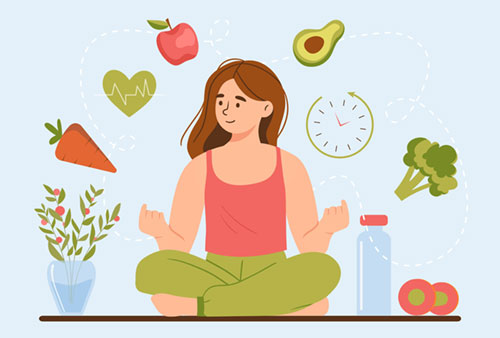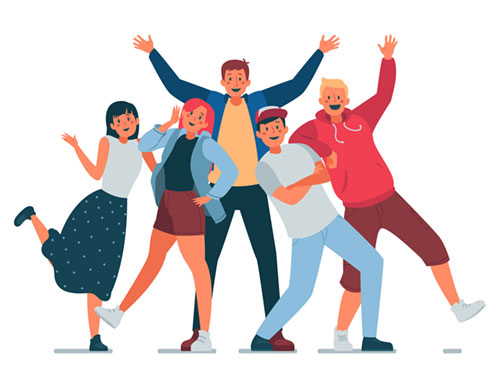Today’s world is fast-paced, competitive, and highly influenced by media.
Youngsters have high expectations of themselves, are under a lot of peer pressure to prove and they also want to balance life and work better which can be quite challenging.

Previous generations might not be able to understand this generation’s challenges and pressures. Of course, the challenges will vary and depend on whom you ask – young adults of different races, income levels, and geographic locations.
Young adults face some physical challenges too and this could be occupation related, due to long hours of work and due to their perception of good health.
Very common problems faced by young adults today include:
Physical Health Issues: Occupational
- Back pain/Neck pain
- Sleep issues
- Cramps
- Carpel tunnel syndrome
- Headaches/Dizziness
- Gastric issues
These problems are common but may not be very serious in every case. Simple measures such as being mindful, maintaining good posture during work, taking little breaks, good hydration, regular exercise, regular meals and balanced diet could make our lives so much better. Of course, when someone is having excruciating back or neck pain which completely interferes with daily life, then they need to seek medical help.

There is a tendency to over-react and resort to extreme measures and this may not be required. Simple interventions could make our lives so much better.
Adopt Healthy Lifestyle
- Set scheduled “ME” time
- Time for relaxation
- Connection with others
- Have a hobby
- Sense of humour
- Exercise regularly
- Healthy diet
- Avoid alcohol, smoking and drugs
- Good sleep

Sleep is an important physiological phenomenon which is literally like recharging our brain and reinforcing the cognitive functions of the brain but it is also the most neglected. In most occasions, sleep related problems are not even recognised until physical and mental well-being is affected.
Good sleep is essential and it is important to follow a good sleep routine or hygiene and it cannot be taken for granted. Some sleep tips are as follows:
- Bedroom should be safe, dark, quiet and comfortable.
- Sleep in the same bed if possible.
- Set regular bedtime and wake-up time.
- Naps of 15-20 minutes (instead of long hours) are great if necessary, during daytime.
- Routine – exercise, bath, etc.
- Avoid stimulants like coffee, soda, coke, etc.
- Avoid alcohol and smoking.
- Learn to relax – stress reduction.
- If you are awake for more than 15 minutes, get up, sit in a chair and read something that is not stimulating in dim light until you are tired.
- Avoid bright lights and television.
Many young adults are doing shift-work and because of this they are forced to change their natural sleep cycle. In such cases, a nap ahead of a night shift may be helpful – this will help in staying alert while working. Another issue with shift work is erratic eating hours. Having set meal times is important and trying to eat at the same time every day will help. Meals need to be spaced evenly over the course of the work day and healthy eating is essential as well. People working night shifts should try to keep a consistent sleep schedule through their working week as this will help the body’s sleep cycle. Using alcohol to fall asleep is not advised. Of course, family too need to understand their unique schedule and sleep need.
At the same time, do not get paranoid about this. Doctors have started observing a condition called orthosomnia which refers to an unhealthy obsession with sleep.
Headaches are also commonly encountered in young adults. If it is sporadic and related to reduced sleep or stress at work, then a simple analgesic or good sleep or relaxation techniques can help. However, if someone suffers with periodic headaches, frequent and disabling, then he could be suffering with a chronic headache type and needs medical help.
The common types of chronic headaches seen in young adults are:
Migraine:
A migraine can be accompanied by an aura that usually lasts between 5 to 60 minutes, typically before headache onset. It may consist of temporary visual, sensory, and speech disturbances. However, a migraine need not always be preceded by an aura.
Tension-Type Headache (TTH):
It is the most common type of headache. It is usually bilateral, pressing or tightening in quality, mild-to-moderate in intensity with no nausea.
Cluster Headache:
It is a rare type of headache that affects men more often and is characterised by attacks of severe unilateral pain.
Headaches are treatable and there are pharmacological and non-pharmacological approaches to good management.
Stress:

Work-related stress is inevitable but we need to understand that good coping mechanisms help us deal with stress better. In case it is long-term stress causing major issues, then please do seek help. In fact, many corporate firms do recognise this and have in-house counselling. Youngsters should be mindful and seek professional help if required.
Friends and family do help as good stress busters and we need to recognise this. If we do not do the right things to beat stress, then there can be cumulative effects such as smoking, drinking too much, overeating or under-eating, too much TV or computer, withdrawal from family and friends and sleeping too little or too much.
It can also lead to depression/anxiety.
So, recognition of the deleterious effects of stress is required for effective and early intervention.
Finally, I would like to touch upon certain very unique issues that young adults face today like body dysphoria, gender dysphoria, information overload and social media pressure.
The world is evolving and we as people are constantly battling newer concepts about what is good and bad. Some people adapt better and some people need help. Do not be shy; if you think you need to talk to someone, then please do so. Do not fall under the pressure of social judgement. There is help available but recognition and availing this help is most important for a happier and better life.
Embrace yourself.

Dr. Bhuvaneshwari Rajendran
Consultant, Clinical Neurophysiology and Neurology
Kauvery Hospital Chennai
